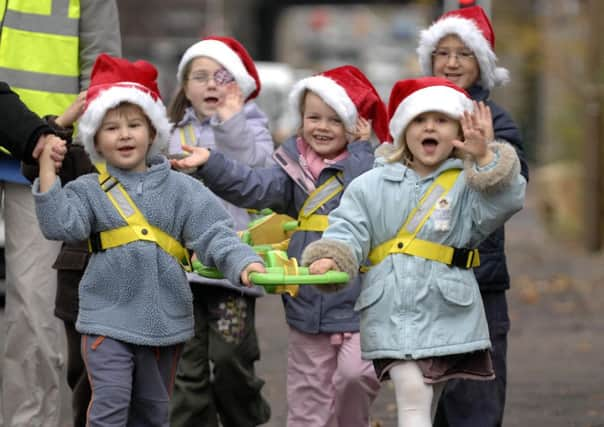Tiffany Jenkins: Lack of trust ruining childhoods,


His school uniform was soaked, his hair stuck to his face and he looked miserable. So I invited him in to my warm and dry house.
Only he shook his head for no, barely looking me in the eye, and stayed huddled outside in the downpour. I am sure it was because he didn’t know me well, even though I live opposite and we frequently pass each other in the street – that he believed it was too risky to venture into my house with me. From birth he will have had the message drummed into him that absolutely no-one can be trusted and that he can never be too careful.
Advertisement
Hide AdAdvertisement
Hide AdIt’s not a particularly shocking tale – the boy was fine, if drenched – it is a common tale. You will have a similar story, I don’t doubt, a situation you have observed when it became obvious that our obsession with the potential dangers to children has changed how we behave towards each other and them. We live in a permanent state of distrust that young people too have internalised.
When it comes to children, we no longer weigh up the likelihood of a negative outcome and act accordingly, we organise every aspect of our lives around the expectation that the worst will happen. Our nightmares dictate how we live.
And still the flurry of child protection policies, which will in the entirety of their accumulated impact do damage, continue.
The drip, drip, drip of the ongoing child abuse inquiries will have a negative impact. Reservations have rightly been expressed about the dangers of a witchhunt for those accused, but what about the dangers to children of such a climate? It is understandable that people believe and want to act on the idea that working out what went wrong and increased early intervention will prevent other terrible acts, but this response is likely to skew resources away from the most in need and will reinforce what is now an unhealthy mantra: that it is unsafe to leave any child alone with anyone.
Plenty of initiatives now routinely finger the most important adults in every child’s life – parents – in a fashion that adversely affects relations between family members.
Consider the state-appointed guardian scheme, where ordinary parents are held to be such a risk to their kids that the state needs to appoint a guardian for children.
It is a scheme that communicates to children that their mums and dads are not to be trusted, that a different adult – one with a professional qualification – is better equipped to look out for them than their own family members.
This greatly undermines the role and place of the parents in a child’s life. What could be more corrosive to relations than that?
Advertisement
Hide AdAdvertisement
Hide AdPerhaps the campaign from the Conservative MP Robert Buckland for a law that would criminalise the emotional abuse of children, or the latest suggestion from the NSPCC, which has just been given a nod of approval from David Cameron: mandatory reporting of suspected abuse?
As soon as one law or policy in the name of protecting children is passed, along comes another suggestion, or two. The former, if passed, will criminalise what can be average interaction and behaviour between family members, meaning we further scrutinise every word, touch and look. The latter proposal, if passed, will mandate further suspicion and intervention where it is not warranted.
The problem is that all the protections designed to keep children safe will end up doing them harm. Ironically, our desire to safeguard children from everyone and everything leaves them inexperienced and unworldly, less able to deal with what are, in the end, real risks – if greatly exaggerated and amplified. And by seeking to inculcate them from every possible danger, we deny them a childhood where they are free to explore the world, try out new experiences, extend their own capabilities and test their limits, ultimately developing autonomy and independence.
Child protection has gone too far and is changing all our lives for the worse. Kids now spend most of their time indoors, constantly monitored by worried adults, instead of playing outdoors on their own or with their friends.
Sir Harry Burns, a professor of global public health at the University of Strathclyde and a former chief medical officer, gave evidence in May to Holyrood’s health committee, warning that our approach to child protection was stopping adults “acting like human beings”.
We’ve reacted to it in a way that I think dehumanises us,” he said, reporting that many teachers and carers are reluctant to touch children because of fears over how they may be perceived. The committee heard of one case where a child returned from a school trip sun-burned because the teacher was too scared to apply suntan lotion to the youngster’s nose and arms.
If we want what is best for children, we need to need to allow them – and encourage them – to trust us. They are innocent, ignorant, and vulnerable, though not as much as child protection zealots would have us think: children can be strong, robust and agents of their own lives in a small but important way.
Children need to be able to spread their wings and have the space to try life out. And they need adults – and especially their parents – to hold the authority to take care of them, check they are doing okay, and guide them as they grow. At the moment, too many laws, policies and child protection agencies stand in the way of this. It is time for the child protection industry to butt out of our lives.